#I don’t think the concept is inherently flawed as an allegory
Text
Why Detroit: Become Human’s Parallel to the U.S. Slavery is Flawed
In the past year being in the Detroit: Become Human fandom, I’ve seen many posts attempting to cover and express why the game’s core message of android rights = black rights is inherently flawed. I recently watched two wonderful video essays, Detroit: Become Human - It’s Bad and Detroit: Become Human - The Worst Civil Rights Allegory, that I think succinctly and elegantly explain why this message is flawed. This post is a brief summary of what the two videos said. All screenshots are from the first video.
Why it’s inherently racist to say human slavery = android slavery
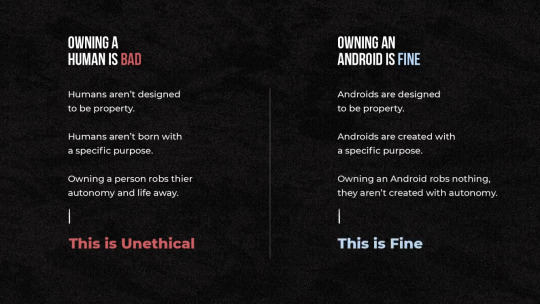

As the two infographics explain above, D:BH’s main argument revolves around “androids are like us; they’re alive, so it’s wrong to enslave them.” A parallel should work both ways– if we can say “android are like humans,” we should also be able to say “humans are like androids.” However, once we do the latter, we can automatically see the flaw of this parallel. In doing so, we’re saying, “androids were made to be property, to serve humans = black people were made to be property and serve white people.” I don’t think I need to explain further why this parallel is outrageously racist.
This leads me to my second point:
The issue of deviancy = bug in an android
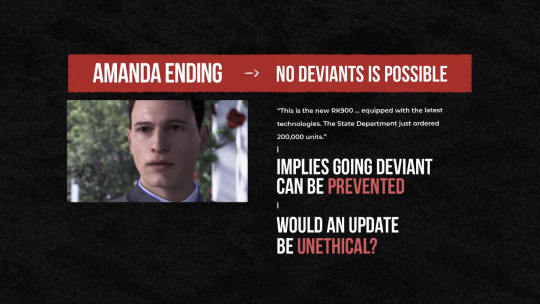
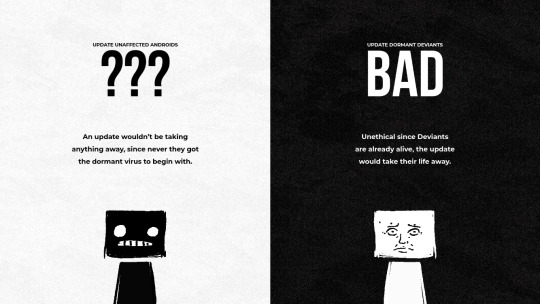
Going back to D:BH’s main parallel of human slavery = android slavery, this again insinuates “black people were made to serve white people and them rebelling against their masters is a ‘bug.’” With the knowledge that deviancy is a virus, confirmed to us by Kamski, Amanda, and Markus and Connor’s ability to deviate androids by touch, players have the idea that only deviants are alive and non-deviants are not.
Kamski: Androids share identification data when they meet another android. An error in this program would quickly spread like a virus, and become an epidemic. The virus would remains dormant, until an emotional shock occurs… Fear, anger, frustration. And the android becomes deviant. Probably all started with one model, copy error… A zero instead of a one… Unless of course... Some kind of spontaneous mutation.
This begs the question: why should we care about non-deviants? If they aren’t alive, they aren’t aware of their own suffering. If we do have the ability to prevent deviancy, why shouldn’t we? As the infographic above explains, this wouldn’t be unethical as non-deviants don’t even have the ability to make this choice for themselves.
However, the game contradicts itself that “only deviants are alive” through the player’s experience of playing Kara, Markus, and especially Connor. All these androids, pre-deviancy, are able to feel and experience emotions, like love, without going deviant. Aren’t these things signs that non-deviants are alive? The only thing deviancy changes for all of them the freedom of choice.
Then, that poses another question: does the freedom of choice inherently make you alive? If you’re just given the freedom of choice without prior experiencing emotions (I’m referencing the androids Markus/Connor deviate by touch here), why does that make you alive?
Which brings me to my third point:
Where are the answers?

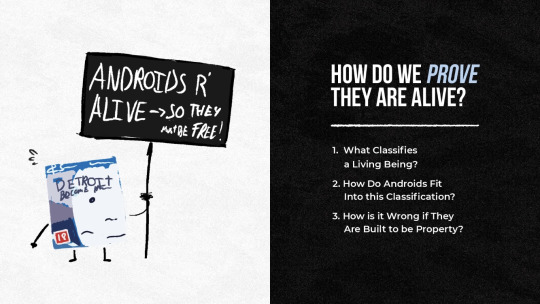
Instead of even attempting to answer any of the questions D:BH poses, the game never goes further than its shallow explanation of “androids are alive, so they must be free.” The game crumbles under any sort of questioning. Furthermore, all the “villains” of the story– Amanda, Perkins, even Kamski– never provide any good counter-arguments to this claim, forcing players to have to agree with this sentiment.
But isn’t the point sci-fi to explore both the good and bad of a futuristic concept? Which brings me back to my original point– the game can’t do this because it’s trying to make deviancy an allegory to black rights, in which any counter-argument to that is morally wrong. But, if it strayed away from this parallel– instead delving into what D:BH should have been (an exploration of what it means to be alive as a non-biological being), the game would be able to apply much more meaningful and thought-provoking messages than “slavery is bad.”
The video provides an example of this exploration being done right, as well as providing a new basis of what D:BH should have been:
Star Trek: The Next Generation | “The Measure of a Man”
This episode of Star Trek: Next Generation revolves around Data, an android aboard the starship Starfleet. In order to start mass-producing androids like Data, they must disassemble Data. However, in the process of doing so, he might lose his memories, effectively “dying.” The episode debates whether or not Data should have a say in this procedure. If he is not deemed as alive, they can do anything to him as it is not unethical to see him as property. However, if he is alive, this would be unethical as they are robbing away his ability to choose and effectively enslaving both him and his “offspring.”
The video explains in a lot more detail the plot surrounding this episode and why it does it well, but I’ll sum it up here why this episode works versus why D:BH doesn’t:
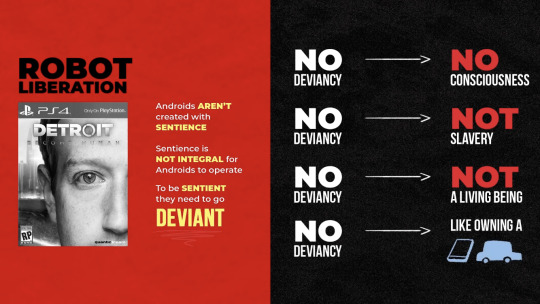
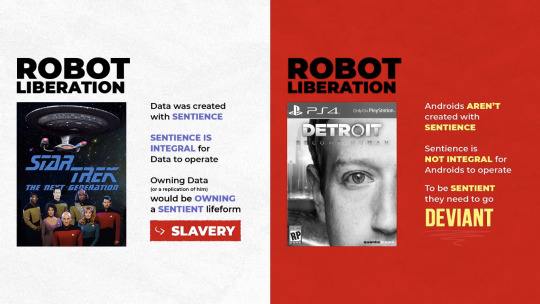
Closing thoughts: What could have been done to change this?
If someone planned on rewriting D:BH, there are two ways of going about this:
Sticking with the human slavery = android slavery message
Ditching that entirely and exploring the central question of what makes a thing alive
Both could work– albeit with major changes. For the first message to work, androids must be created with sentience. Instead of androids, one could maybe replace them with human clones or simply doing what Star Trek: Next Generation did– however, this would mainly defeat the whole meaningfulness behind the concept of deviancy.
With the second, this requires the least amount of tweaking to the original plot (most of the change would be towards Markus’ storyline). By simply using the premise that D:BH provides as way to explore how we prove androids are alive, D:BH could finally reach its full potential as a game and be the impact on sci-fi that it wished to be.
#first post in like 5 months whoopsies#ive been going through a lot of personal shit recently#such as almost unaliving myself and school in general being a bitch#im back tho now!!#anyways hope yall enjoy this post and plz do watch the two videos linked#they do a much better job at explaining the flaws of dbh#and this post is just a summary#robofam#dbh kara#dbh alice#dbh luther#the android triumvirate#dbh connor#dbh hank#jericrew#dbh markus#dbh north#dbh josh#dbh simon#dbh meta#dbh essay
37 notes
·
View notes
Text
The Promised Neverland
Well that happened.

I finally caught up and I’m--yeah.
I still think, on a reread of the earlier chapters (since i’d kind of fallen off the regular reading pattern, I went back and reread) that the opening chapter for TPN is the strongest opening chapter in almost any manga. It’s so well done, shocking in its twist and yet intriguing. Its themes are excellent, and it feels like it’s an allegory for something, but it could perhaps be many things. Like many of my favorite stories (Banana Fish, Mawaru Penguindrum, Attack on Titan, etc.) it emphasizes the wrongs done to children by society, and tries to up the horror so that you can truly understand how wrong it is that children are treated like this. It focuses on dehumanization and does so by using a real world concept--farming and factory farming too--to shock and disturb the reader. These themes are extremely well executed.
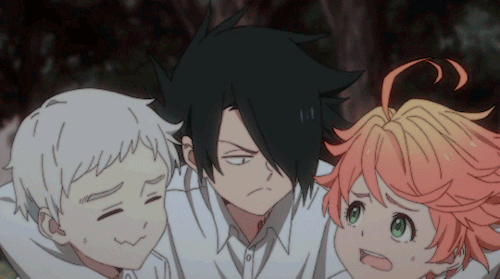
Its weakness as a story is, to me, the characters, none of whom feel as complex as they have the potential to be. Emma is a wonderful heroine and I like her a lot, but I really hope her worldview is challenged a bit more than it has been. Then again, her optimism is kind of refreshing in a story that’s extremely dark, so I’d like to still see it affirmed even if I want it challenged. And maybe that’s just the kind of story it’s trying to tell, but it’s so dark in other ways that I wish for more complexity.

I think the reason I’m more drawn to characters like Isabella, Krone, and especially Ray and Yugo, is that they are the more morally gray ones, whereas the others are just good babies even with their flaws. That doesn’t inherently make them weaker characters, though; it’s just a preference. Isabella is an extremely well done female villain, but I do wish that there would be more emphasis given to the fact that Ray is her son, and more focus on their relationship than was given (at least thus far). I also want more Ray development since it’s been awhile. I very much loved Krone’s character, but her fairly racist design made me uncomfortable. Still, she’s an excellent character in terms of her development and role in the story.

Yugo... I finally loved a mentor character and then he met the fate of all mentors, and I was left staring into the void of despair reminding myself why we don’t do this. His restoration of his faith in humanity and his love for others was beautiful to see.

Anyways, I’d give it 7/10 stars.
60 notes
·
View notes
Note
🔥 torchwood, lost & detroit become human??
torchwood: i don’t think its that bad. the way the bi rep was handled is kinda wonky because… 2006 but like, overall its a good show. series 2 especially
also i love gwen. i dunno how much gwen hate still exists now but yeah
lost:
the finale was great, fantastic, beautiful, A+++
the characters matter more than the ~mysteries~
i like/love jack, kate, ana lucia, michael, charlotte, shannon (heck, insert any female character name here because they’ve all gotten ragged on)
jacob is a bad person
i don’t think kate & sawyer work as romantic partners, i just like them as friends. i approve of several ships in the love square but thats one i’m ehhh about, and i know its very popular
i like sayid/shannon. nay, i love sayid/shannon
but overall im happy the modern lost fandom is fulla queer feminists because from what i’ve seen, the old lost fandom (2004 to 2010) was… not as pleasant
detroit become human
oh gosh this is gonna be bad (i have friends who hate this game)
i wanna make it clear ahead of time that i absolutely am aware of the flaws in this game and i’ve even spent a lot of time discussing them with my friends.nobody can diss dbh better than a dbh fan, believe me. i can be aware of something’s flaws and still like something (anybody whose followed me for lost knows i’ve dissed the flaws in lost loads of times. i still love it!)
also the dude who wrote/directed this game is an asshole, an idiot, a sexist and a bunch of other bad things. thats not an unpopular opinion, i just wanted you guys to know that i know this. when i praise dbh, i’m not praising him
long story short, i like the creation not the creator
i went on a bit so its under here
despite who made it: it’s a good game, brent
i think despite its flaws, there’s more good things than bad things
allegory isn’t inherently racist. note my emphasis
“heavy handed”, “on the nose” and “not subtle” aren’t bad things? i see it get used as insults a lot but to me i got no bother. not subtle doesn’t mean bad. bear in mind that i’ve grown up a star trek and x-men fan so yeah
i don’t wanna say the word overrated because i don’t believe in that. i just find it interesting how certain characters are getting a lot of attention (e.g gavin, nines) whilst other characters are ignored or reviled. thats not me saying the characters whom are popular in fandom should be ignored, thats me saying i’d like more focus on other characters i like too e.g markus, kara, kamski, the jerries, north, josh, rose & adam and a bunch more. i just really like all the androids and some humans okay
like, its pretty obvious why simon (white man) is being adored whilst josh (black) and north (woman) are being ignored and despised respectively, right? and thats not me hating on simon or saying less simon. i like simon! (or like, what can be done with him bcuz canon simon has no depth)
i just happen to like josh and north! which deserves its own bullet point
not only do i like north, i love north and she’s one of my fave characters!
i do not agree with the often used phrase “hank and connor are the only worthwhile part of this game”, in fact, i hate it. sure, the best part of the game, go ahead. but the only worthwhile part? fuck you, because
i like markus and kara and their stories! whilst most my problems with this game are in markus’ story (just trust me on that), overall i still like it. and kara? heck theres not a single kara chapter i don’t like. and on that note:
i don’t consider kara’s story to be useless. yeah she’s not part the revolution plot but thats not bad. i think it provides a balance. think of it like this: markus represents The Leader, the liberator, the messiah. he is fighting for his people. and he comes from a privileged background. connor is representing The Man, The System, depending on how you play him he is rebelling against The System or is a part of it. now what does kara represent? The People. her and the other androids she encounters represent the average android in this world. markus and connor can’t do that so i feel its important we see her. we’re seeing what markus (and maybe connor) are fighting for. and i think thats really important
and besides all that, i just plain like it okay
i like markus/north, i think they make a good couple (moreso in my head than in the game but i still think they’re sweet in the game)
the concept that pacifist markus and north don’t “make sense together” is stupid because ur assuming north is bloodthirsty and has no room for growth. and that all couples need to agree with each other. also north for violent markus and simon for pacifist markus also makes no sense to me becuz 1. people aren’t rewards, 2. ur confusing simon with josh. again. and 3. violent!markus and north would just be enabling each other. if north is to be with any markus, it should be pacifist markus because they’d be good for each other. also all three of them being options woulda been nice but that’s not an unpopular opinion anyways so moving on
the awkwardness felt about markus/north coulda totally been fixed by literally just one change. take the “lover” indicator and move it until after their first kiss. that way the timing is far less jarring and because the player can choose the kiss or not, the “lover” thing feels more like “yay i made their relationship grow” and less “oh whoa that was sudden”. if that was moved and nothing else changed, markus/north would’ve been way more loved. but alas, markus’ relationship scanner is just damn awkward
markus, my markus, is a verse and a kind, socially inept boy (i like how with the jericho four, north is a rowdy girl whilst the other three are various kinds of soft boys in their own way. i think thats cute and neat)
connor is not an innocent niave dumb bimbo (save that for the bedroom) and i wanna remind ppl that he’s an expert on psychology
the humans killed by daniel, ralph, echo (blue traci), shaolin (HK400) and north all deserved it
north, josh and simon would not all hate each other, fuck you. these people are meant to be friends, remember? (also jericho OT4, y’all!!!)
the facial expression on simon’s face after markus and north kiss at the end is gentle approval. he looks happy, some ppl are just projecting
i don’t mind that alice is an android
the way some markus/simon shippers talk about north is downright sexist and i think most north hate is caused by sexism & rape apologism
(i’m a live and let live kinda person about ships and also i’ve very into multishipping so some y’alls behaviour is perplexing to me)
there is nothing inherently morally wrong with shipping hank/connor. connor is capable of consent and age differences aren’t inherently bad. and the only reason this ship is controversial is because hank looks old and he’s not conventionally attractive. nobody would care otherwise
kamski isn’t evil, he’s morally ambiguous / chaotic neutral
i, uh, like kamski/chloe. its interesting (i’ve embraced that it’s fucked up) and i like the idea that chloe actually does love him. its kinda tragic?
a bunch of that was more about the fandom than the game but whatever. and as usual when i make a list, theres probs more but like, thats what comes to mind
yeah there was room for improvement on this game but overall i think its great and i like the characters, more than that i like what can be done with the characters. like, its a nice place to build from. and like, the people who are all like “if ur a fan of detroit become human, ur a bad person” can just fuck off
thats not how… anything… works
and besides its a piece of android media, done in a story based game, that has android babes and is fulla allegory and it’s something i can analyse to death (and as a bonus, the graphics/rendering/mocap/texturing are PHENOMENAL)
of course this is something i would like and i won’t apologise for that
#i went into dbh more because i haven't done so a lot on tumblr#partly because liking this game is considered controversial#but whatever idc#(if ur under the impression that liking this game somehow inherently makes me a bad person i want you to know that ur ridiculous)#most of my dbh talking happens on discord#a lot of times with my mouth words#anyways long story as short as possible: dbh flawed but i like it#its just that those words can extend into full flown essays#or several 8 hour rants with my friends on discord (im not kidding)#or way or another#i wouldn't care so much if i wasn't a fan#like y'all see me putting energy into things i dislike/hate?#fuck no that'd be absurd#agardenintheshire
8 notes
·
View notes
Text
About parental figures, Ketch, and change
I have talked here about the negative parental (real and metaphorical) figures in 13x18 and (lack of a chance of) redemption in relation to them. But the topic isn’t really over, because there are more parental figures in the episode and more talk about redemption and change to make.
First of all, I want to point out a little moment that frames Cas as a parental figure, of course in metaphorical terms, in the scene where he and Sam are trying to get Gabriel to reacquire the bit of grace from the tiny bottle.
We have Cas pretty much framed as a parent in the scene (he did read everything he could about parenting small children, after all), and his attitude is framed negatively: “Sam, I don’t think he’s gonna open up and let the choo-choo in. A technique for feeding recalcitrant children. And... I think a little coercion may be necessary.” He tries to force Gabriel to reacquire his grace, and the non-consensual nature of the situation makes Gabriel react badly. (I wonder if this is some kind of foreshadowing of Cas having to learn to respect Jack’s consent over his own choices - and if we teach a thing or two to Jack about consent, even better -. Considering also Cas’ whole thing with Donatello, I wonder if we’re seeing a Cas-and-the-concept-of-bodily-autonomy thing of sorts. But I’m digressing.)
So, we have multiple father figures in the episode - Asmodeus as an abusive father allegory, Lucifer and his fantasies of fatherhood, Cas and the choo-choo train. Then, there is a direct parallel to the attempted healing of Gabriel: Cas and Sam trying to heal Gabriel is paralleled, even by the editing that juxtaposes the scenes (the scene with Cas trying to “jolt (Gabriel’s) mind” is placed right in the middle of the other), to Ketch healing Dean from the poisoned bullet.
*I don’t want to think that “jolt his mind into thinking straight” is a parallel to John’s parenting of Dean to make him... think straight, if you get what I mean, but Cas is framed as a parental figure that disregards consent in this circumstance, so... it’s probably a stretch, disregard that thought, but still.
Anyway. As I mentioned before, Cas’ approach is negative because he resorts to coercion, and his brusqueness makes Gabriel react badly. On the other hand, Ketch - ironically, the psychopathic cold-blooded killer, but who’s finding his soul - is surprisingly sweet with Dean, earning a sarcastic (but the sarcasm is always a cover... *cough* he’s exactly your type, Dean *cough*) “how’s it look, mom?”.
Ketch becomes a metaphorical mother figure in the situation, and that sort of enriches his narrative role as a Cas mirror (of course, he’s also a Mary mirror for other reasons, but the subtext is definitely polysemic there). On one side, we have the queercoding vibe that has always been there since the beginning of Ketch’s arc (guy with dark hair and light eyes starts by being a member of a group of heartless sons of bitches who want to recruit Dean for their grand plans, then gets out and starts not being a dick, I have never seen that before), on the other side Ketch’s “mom-like” attitude in the episode is paralleled to Cas’ parental attitude with Gabriel, and one is positive, the other is negative. If we consider all the parental figures in the episode “fathers” while Ketch is a “mother”, then all the fathers are bad and the mother is good.
Now let’s keep talking about Ketch. Did we need a redemption arc for him? Well, probably not, but I am enjoying his arc in season 13 a lot, and I hope the fans who were cold about his return in season 13 have also grown to appreciate it. His interaction with Asmodeus in 13x17 was pivotal - Asmodeus claimed he knew Ketch better than Ketch knew himself, that he could see behind Ketch’s supposed façade and see that Ketch was the same as Asmodeus, i.e. someone with no chance of redemption, someone who can only spread pain around, because they have nothing but pain inside (and fear and regret). But Ketch now decides to be his own person, and decides to reject the whole identity he had with the Men of Letters (the “rubbish” duty that caused his pain and regret in the first place) and decides that he doesn’t have to spread pain around, but he can wash some of the stains off his hands by doing some good.
He’s finally finding his identity, thanks to - let’s face it - exposure to Dean Winchester (...it happens). We found him at the beginning of the season literally pretending to be someone else, and Dean “unmasked” him. Now Dean has given him the opportunity to “unmask” the “chewy middle” he hid deep inside, the “soul” he told Asmodeus that was the difference between Asmodeus and himself.
I think I haven’t gotten to write about this thing about 13x17 so I’ll do it now - it’s interesting that, after exploring how monsters can be humane and humans can be monstrous, and that neither “nature” automatically makes you what you are but it’s your choices that do it, eventually the show does explore if having a human soul does indeed make a difference, at least at a level of potential: Donatello, without a soul, got irremediably corrupted by the power of the demon tablet; and demons, at the end of the day, whose soul has been corrupted into something drastically different to the point that for all intents and purpose they don’t “have” a soul, do not have the same potential to redemption that a human has. But more than about the nature of demons (we’ve seen demons that were able to change to some extent, although this would be a whole topic of its own), this tells us more about the nature of humans: there is a potential for redemption there, even in someone like Ketch who’s not exactly a good guy. Lucifer is wrong, humans are flawed but not “beyond redemption” (this is not what Lucifer was saying, of course, but the subtext is this). Humans have a potential for change, for betterment, for hope even when they “suck”. Donatello’s corruption happened because Amara took away from him what made him authentically human: what was left didn’t have the potential inherent in humanity.
And of course... this brings us to the angels. Lucifer groups humans and angels together in his judgement that they’re “flawed beyond redemption”. The second occurrence of the word in the episode, of course, is uttered by Gabriel. The unspoken question in the episode is, can angels also change? Do they have the same potential for “redemption” as humans? “That PB and J taught me that angels can change” said Cas in 9x11, but Cas seems to be inherently different, so now it’s up to Gabriel to show us if ‘proper’ angels can change...
To conclude, we end up with the current arc about change in heaven. Anael pushes for a betterment of Heaven (in the episode, she says both “make heaven better” and “make heaven right”), but we don’t really know what’s her idea of that yet. Would that include a fundamental change in the way angels approach their individual and collective identity? Would that include the purpose of heaven? The way heaven is run, the way that caused the Bobbies to become ‘surly’? Is heaven going to change? Are angels going to change?
93 notes
·
View notes